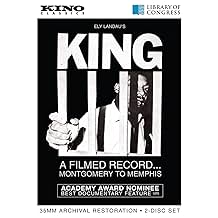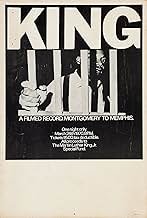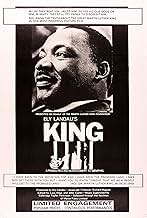अपनी भाषा में प्लॉट जोड़ेंFollows Martin Luther King's life and decades-long civil rights activism.Follows Martin Luther King's life and decades-long civil rights activism.Follows Martin Luther King's life and decades-long civil rights activism.
- निर्देशक
- लेखक
- स्टार
- 1 ऑस्कर के लिए नामांकित
- 1 जीत और कुल 1 नामांकन
Martin Luther King
- Self
- (आर्काइव फ़ूटेज)
Ralph Abernathy
- Self
- (आर्काइव फ़ूटेज)
James Baldwin
- Self
- (आर्काइव फ़ूटेज)
Tony Bennett
- Self
- (आर्काइव फ़ूटेज)
Leonard Bernstein
- Self
- (आर्काइव फ़ूटेज)
Marlon Brando
- Self
- (आर्काइव फ़ूटेज)
H. Rap Brown
- Self
- (आर्काइव फ़ूटेज)
फ़ीचर्ड समीक्षाएं
I was able to catch about the 2nd half of this on cable recently. The remnants of the divide between the North and South dating back to the civil war were played out as MLK continued his crusade in Alabama. This was a gripping account of the small victories that he rallied the public to empower themselves. I found it more engrossing than other MLK documentaries because it examined the battles more closely. But then, interspersed within this footage presented without narration, the film breaks to a stage with minimal theatrical backdrops. Periodically, a famous actor will give a 2 -3 minute famous speech from a notable source. These quotes are not given any introduction or provided any titles to inform the audience. The pieces I saw in the last part were Charlton Heston, James Earl Jones, and a few others I didn't recognise. After reading the trivia notes about this film on IMDb, I understand this was a fund raising film for a charitable organisation. That explains the appearances by the big name stars to get people to pay to see the film. On the other hand, it extends the film running time. I found myself impatient, waiting for the film to return to the shocking footage of churches being bombed, killing children. But on the other hand, seeing James Earl Jones give a powerful performance complimented the film.
Production wise, there were moments of choppy editing, but letting the footage and MLK's words speak for them-self is very compelling.
Production wise, there were moments of choppy editing, but letting the footage and MLK's words speak for them-self is very compelling.
The version of this documentary I saw did not contain any of the celebrity "bridges" that Maltin mentioned in his review. The version I saw, ran only 103 minutes (as to the 185 of Maltin's version) and contained only archival footage of Dr. King's career from 1955 to 1968. This version is a pure video diary of King's speeches and marches. It contains amazingly powerful footage of the nonviolent protests and the final moments of King's life.
More than half a century after Dr. Martin Luther King Jr. was murdered, I finally looked at this movie. It is a collection of Dr. King's appearances and the events around him, interspersed with celebrities of the day speaking in admiration, edited by two of the leading film makers of the day with the assistance of two editors, attempting to make coherent sense of what, half a century later, is a senseless and evil situation and the effort to remedy it.
It's a huge effort, and brilliantly produced. "How Did We Get Here?" is a question that needs to be examined, if only for its cautionary value.
I looked at this off a TV presentation, skipping the commercial interruptions. I did notice the note "Viewer Discretion Warranted." I suppose people think truth is something people need to be discreet about. Recent events indicate that people have let the lessons I learned as a child drop out out their thoughts, and thereby permitted these hateful actions return. Yes, discretion is required. Otherwise people might remember, and remain silent about them.
It's a huge effort, and brilliantly produced. "How Did We Get Here?" is a question that needs to be examined, if only for its cautionary value.
I looked at this off a TV presentation, skipping the commercial interruptions. I did notice the note "Viewer Discretion Warranted." I suppose people think truth is something people need to be discreet about. Recent events indicate that people have let the lessons I learned as a child drop out out their thoughts, and thereby permitted these hateful actions return. Yes, discretion is required. Otherwise people might remember, and remain silent about them.
We just passed what would've been Martin Luther King, Jr.'s 90th birthday, so I decided to watch this documentary. You've heard about Martin Luther King, Jr. You've probably seen footage of some of his speeches. But to truly understand him, you have to see Sidney Lumet's Academy Award-nominated "King: A Filmed Record... Montgomery to Memphis". Originally screened as a one-night event, it's now available for home viewing. The documentary consists of footage of King starting with the bus boycott in Montgomery until his funeral, emphasizing how he called upon the United States to live up to the ideals that it professed. Whether addressing racial and class issues or coming out against the Vietnam War, he was on the front lines of justice every step of the way.
The documentary includes footage of people (Harry Belafonte, Ruby Dee, Paul Newman, Joanne Woodward, etc) quoting King. It emphasizes the diversity of people who stood on the side of morality. In an era when we see racism coming back to the fore - pushed by the current demagogue-in-chief - it's more important than ever to understand King's legacy. Definitely see this documentary.
The documentary includes footage of people (Harry Belafonte, Ruby Dee, Paul Newman, Joanne Woodward, etc) quoting King. It emphasizes the diversity of people who stood on the side of morality. In an era when we see racism coming back to the fore - pushed by the current demagogue-in-chief - it's more important than ever to understand King's legacy. Definitely see this documentary.
11/18/17. A bit on the long side, but at least you get the chance to listen to the entire "I have a dream." No denying that King was a force to be reckoned with. His oratory style is reminiscent of the fiery preacher of past, and still quite effective in inspiring its listeners to bigger and better things.
क्या आपको पता है
- ट्रिवियाThis film originally was shown at theaters as a "one-time-only" event on 24 March 1970 and ran 3 hours and 5 minutes. The proceeds from the $5 admission price were donated to the Dr. Martin Luther King Jr. Special Fund. It was later shown on US television, unedited and with limited interruption.
- इसके अलावा अन्य वर्जनA second version, edited down to 103 minutes, was released onto videotape. It is missing the celebrety narratives and an opening montage of clips of militant black leaders with violent rhetoric contrasting to clips of Dr. King's non-violent messages, but includes the original introduction by Harry Belefonte, and consists entirely of newsreel footage.
- कनेक्शनFeatured in Is That Black Enough for You?!? (2022)
टॉप पसंद
रेटिंग देने के लिए साइन-इन करें और वैयक्तिकृत सुझावों के लिए वॉचलिस्ट करें
विवरण
- रिलीज़ की तारीख़
- कंट्री ऑफ़ ओरिजिन
- भाषा
- इस रूप में भी जाना जाता है
- Dann war mein Leben nicht umsonst - Martin Luther King
- फ़िल्माने की जगहें
- उत्पादन कंपनी
- IMDbPro पर और कंपनी क्रेडिट देखें
- चलने की अवधि3 घंटे 5 मिनट
- रंग
- ध्वनि मिश्रण
- पक्ष अनुपात
- 1.37 : 1
इस पेज में योगदान दें
किसी बदलाव का सुझाव दें या अनुपलब्ध कॉन्टेंट जोड़ें

टॉप गैप
By what name was King: A Filmed Record... Montgomery to Memphis (1969) officially released in India in English?
जवाब




































